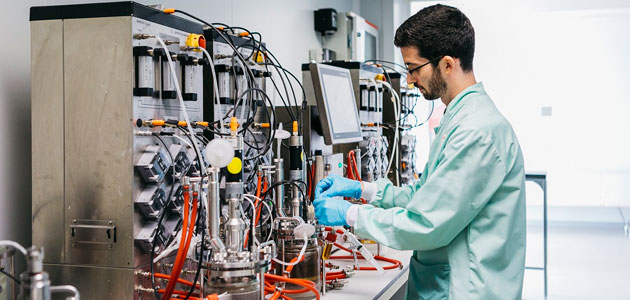
According to Mercacei, the Olivar Health Operational Group investigates innovative and sustainable detection, control and treatment strategies against Xylella fastidosa and verticillosis, two of the diseases that attack the olive tree with the greatest virulence. AINIA, together with the Granada-based company DOMCA, Dcoop, Laboratorios NEVAL (Valencia), VISIONA Ingeniería de Proyectos and the Association of Manufacturers of Biocontrol Solutions (IBMA Spain) are approaching this project from three aspects: prevention, early detection and treatment of already contaminated trees.
The consortium, through AINIA, is working on the isolation of wild variants of the Verticillium fungus, as well as developing, in collaboration with DOMCA, solutions based on the use of proteins from bacteriophage viruses for the control of Xylella. A solution based on recombinant proteins as a corrective tool for the treatment of said disease.
The consortium has developed a first genetic design for the expression of a specific endolysin for the control of Xylella. In addition, parallel designs are being carried out with different systems of penetration into the pathogen cell.
Bacteriophages (bacterial viruses) are an alternative to traditional pesticides because they exclusively infect harmful bacteria, without harming the rest of the tree as occurs with conventional treatments.
New biostimulants to increase the resistance of the olive tree
In addition, new biostimulants are being developed to apply to crops and increase the resistance of the olive tree to stress, or improve the quality of the olive harvest. In this line, the development of products, based on microorganisms with biocontrol capacity against Verticillium, DOMCA, in collaboration with AINIA, will provide solutions based on plant extracts, for the control of verticillium.
In a first stage, in vitro studies are being carried out in the laboratory, selecting the most effective products. In a second, the agro-food cooperative Dcoop will be in charge of evaluating and validating the new developments in real conditions in the field. In turn, the consortium has the experience of Laboratorios NEVAL, in charge of coordinating and supervising the applications of the different products, VISIONA IP and IBMA Spain.
“The evaluations at different times and stages of the fungus and the tree require scientific knowledge and rigor. The different parameters that the research technicians monitor will provide information for future strategies ”, stated Kristell Santander, Director of Studies at NEVAL.
Automated systems for crop monitoring and biocontrol
Finally, the consortium will apply automated systems for crop monitoring. In the first execution period of the project, a diagnosis of the incidence of Verticillosis has been carried out in the DCOOP fields, located in the province of Córdoba, as well as a characterization of the microbiota present in the soil, and an analysis of how it affects the disease to its composition at the microbiological level.
The working group will also apply hyperspectral and thermal remote sensing, along with more sustainable and natural biocontrol systems for automatic symptom detection. In this biocontrol and biostimulation strategy, microorganisms with antagonistic capacity against the fungus causing the disease have been identified, and formulations are being developed that allow their application in the field as a prevention tool.
These technologies will reduce the use of traditional chemical pesticides to prevent and control both emerging olive tree diseases (such as Xylella fastidiosa) and endemic diseases (verticillosis).
«Early detection and monitoring of crops will help a more rational use of traditional chemicals and a more successful use of biocontrol tools,» said Estefanía Hinarejos, director of the IBMA Spain Association.
Initial symptoms of these diseases
Although there are currently strategies for the management of olive tree diseases, according to the consortium, these are usually based on low-tech practices and the use of synthetic pesticides. In her opinion, with traditional control and detection methods it is not possible to detect the initial symptoms of these olive tree diseases, so in most cases, when the disease is detected it is already too late. «Prevention, early detection and treatment of already contaminated trees through innovative technologies is key,» she assured.
«In this project we intend to develop tools for the early detection of diseases that pose a threat to the sector and seek alternative methods based on natural products to combat them,» said José Manuel García-Madero from the company DOMCA.
For his part, Joaquín Espí, technician from the Biotechnology department of AINIA, has ensured that «this modernization of cultivation practices will have an impact on the entire value chain of the olive tree: from the farmer, through the transformer of the olive industry or of table olives, until reaching the final consumer; that will be able to access products produced in a sustainable way, free of chemical phytosanitary products ”.
Given the current situation in the sector, the members of this operating group hope that their progress will have a positive impact on the entire olive value chain. «We trust that Salud Olivar is an example of commitment to the progress of the olive industry and improves the productivity of Spanish farms through the development of sustainable strategies that allow higher quality products and greater added value», highlighted Silvia López-Feria , Head of R + D + i at Grupo Dcoop.
The supra-autonomous group of researchers, led by AINIA, is co-financed by the European Agricultural Fund for Rural Development (EAFRD) of the European Union and the Ministry of Agriculture, Fisheries and Food (MAPA), within the framework of the National Rural Development Program 2014-2020.